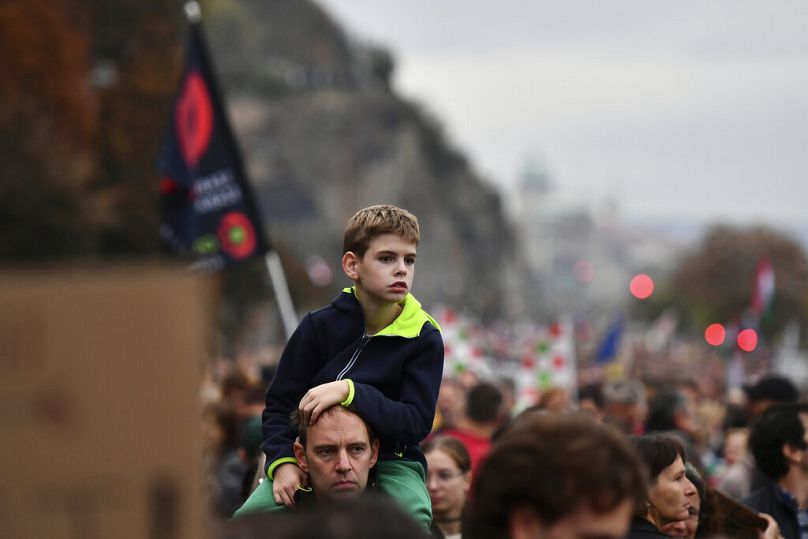The law, approved by the governing Fidesz party 136-58, revokes teachers’ status as public employees, increases allowable weekly working hours and lets educators be transferred to other schools experiencing teacher shortages.
When Hungarian lawmakers passed a controversial law revoking teachers' status as public employees, Kata* knew what to do – quit her teaching job.
"I did not want to get silenced," she says, referring to the "revenge law" that many say could curtail educators' freedom of speech.
Kata's job as a special needs teacher was representative of Hungary's stumbling education system and what thousands took to the streets for: underpaid, overworked, and now, silenced.
Growing protests were met by government crackdowns, in the form of a decree that will deem teachers' protests as civil disobedience with a stricter performance evaluation system.
For Kata, and several protestors, it meant working for lesser money, under more pressure.
"It was unbearable," the 28-year-old says. "The fact that in the new system, the head of the school district would be the only one to determine my salary, based on how loyal I am to the government."
Hungary's educators are the lowest paid amongst the EU members in the OECD with entry-level positions offering monthly wages as low as €500.
On the flip side, the government has continually defended its new law as a merit-based one, with teachers who work more getting paid more, on condition that the EU releases funds for teachers.
'There will be fewer teachers in public schools'
Although the law will come into force in September, it has started showing its effects already, Zsófia Moldova, program director at the Hungarian Helsinki Committee, told Euronews in June.
According to Moldova, retaliatory dismissals took place against protesting teachers throughout the autumn of 2022.
"During the demonstrations, the majority of the competent but self-conscious teachers either got fired or resigned," Zsuzsa*, a new primary school teacher, tells Euronews, anticipating fewer teachers in public schools.
She fears the damage has been done, and feels existing teachers will not be able to operate a "functioning" system under restrictions. Educators belonging to streams with lesser students will also be vulnerable to random transfers without sufficient rationale, the 26-year-old adds.
"My greatest fear is that they will order me around to another school to teach in," she tells Euronews. "I'm in the minority of my faculty who don't have children so it would be the easiest to send me away."
The law, despite being presented as an effort to promote meritocracy will ultimately reward "friendships" than achievements, according to Zsuzsa.
Increasing job vulnerability now coupled with the new law will lead the education system to "collapse" sooner or later, she adds, pointing to the country's long-standing teacher shortage problem.
According to PDSZ, Hungary's Democratic Trade Union of Teachers, the country's school system is already short of 16,000 teachers. More have resigned as a result of the new law.
'I'm not going to be a teacher'
The lack of new teachers stands as the most worrying concern in the Hungarian education system with less than 1.3% of the total university applicants pursuing teaching as their primary major in 2023.
The new law will serve as another entry barrier for a profession blighted with overwork and low pay, says Adojan*, a 24-year-old teaching programme trainee.
"I am in a lucky position to not have to commit to being a teacher," he says, quipping the new law has made him change profession even before starting.
"This new law being implemented made me sure that I'm not going to be a teacher. I also realized that if I want to meaningfully maintain a career and want to have a family, I will not be able to have teaching as a job as it's just simply not possible to have both," he adds.
Since employees in the education system will now no longer be able to raise concerns, it will defeat the sole purpose of education, Adojan claims. The situation is already very bad and is only going to get worse, he adds, with teachers now being "actively harassed" by the government.
Both Kata and Zsuzsa agree.
"I think it is problematic because these teachers will have a harsh time teaching students how to stand up for themselves. And it would cause no better change in this situation," Kata says.
Zsuzsa believes the situation will only worsen, inducing a collapse that will not only affect the education system, but children, parents, and the country in general.
"This will result in raising a generation of uneducated young adults who will not be able to maintain a first-world country economy," she added.
*Names have been changed at the request of the interviewees to protect their identities.

